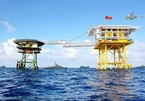China is trying to show that it has rejected the decision of the arbitral tribunal.

Carl Thayer from the University of New South Wales
According to Thayer, a veteran researcher on the region, China is trying to prove to Vietnam and the international community that they have sovereign rights over all marine resources within in the nine dash line claim, even if the claim overlaps with the legal exclusive economic zone (EEZ) and Vietnam's continental shelf.
| China also is trying to prove that they reject the judgment three years ago by the arbitral tribunal. They have created a precedent of not complying with the arbitration tribunal's judgment without having to bear any consequences. |
In 2018, China proposed marine economic cooperation between coastal countries, but not including companies from outside the region.
In other words, China protested against all the actions taken by coastal countries to develop marine resources within the illegal nine dash line it has drawn. They are also against any joint efforts between any coastal country and a foreign partner to exploit marine resources. They want to force coastal countries to co-develop resources in accordance with their rules.
China also is trying to prove that they reject the judgment three years ago by the arbitral tribunal. They have created a precedent of not complying with the arbitration tribunal's judgment without having to bear any consequences.
Vietnam’s efforts in the political-diplomatic front should continue. The regular presence of law enforcement forces in the area where China sent the Haiyang ship group is necessary.
Coastal countries in the region need to mobilize the international community’s support on the basis of respect for international law and the UN Convention on the Law of the Sea, and raise the issue at every multilateral meetings.
ASEAN may consult with friendly members of the international community on joint actions to put pressure on China to force them to withdraw from Vietnam's exclusive economic zone, as well as take no action to infringe on the sovereignty and interests of other states in the region.
Political and diplomatic reactions are necessary, but if China does not change its policy, legal action may be considered.
Three years ago, the arbitration tribunal passed judgment on the case of the Philippines suing China for their claims in the East Sea. The Court rejected China's claim on the nine dash line and Chinese historic rights to the waters within the nine dash line claim.
What littoral states in the region and the international community can do is ask China to fulfill its legal obligations and comply with the ruling of the arbitral tribunal, and politically respond when China violates UNCLOS.
The grey zone strategy
China is trying to change the status quo of using the gray zone tactics, i.e. they they are not using the regular military force. They continually use fishing fleet, militia and marine surveillance force to challenge the legal presence of fishermen and maritime law enforcement agencies of coastal states.
China is trying to weaken the sovereignty and jurisdiction rights of coastal states in their exclusive economic zones and continental shelf, threatening the countries and making them step back or concede to China.
ASEAN needs to be stronger in its joint statement after high-level meetings. They need to be frank in negotiations with China on the East Sea Code of Conduct (COC) and make it clear that no progress will be made until China stops illegal actions in the exclusive economic zone and continental shelf of sovereign countries in the East Sea.
Thai An

US security advisor criticises China’s acts in East Sea
US national security advisor John Bolton on August 20 accused China of using “bullying tactics” in the increasingly tense waters of the East Sea.

Armed conflicts in East Sea will be disastrous
The armed conflict in the East Sea will be a disaster not only for Vietnam and China but also for the whole region and the world, says Vu Thanh Ca from the University of Natural Resources and the Enviornment.
 Carl Thayer from the University of New South Wales (Australia) made a comment on the return of the Chinese Haiyang 8 infringing on Vietnam's exclusive economic zone and continental shelf.
Carl Thayer from the University of New South Wales (Australia) made a comment on the return of the Chinese Haiyang 8 infringing on Vietnam's exclusive economic zone and continental shelf.